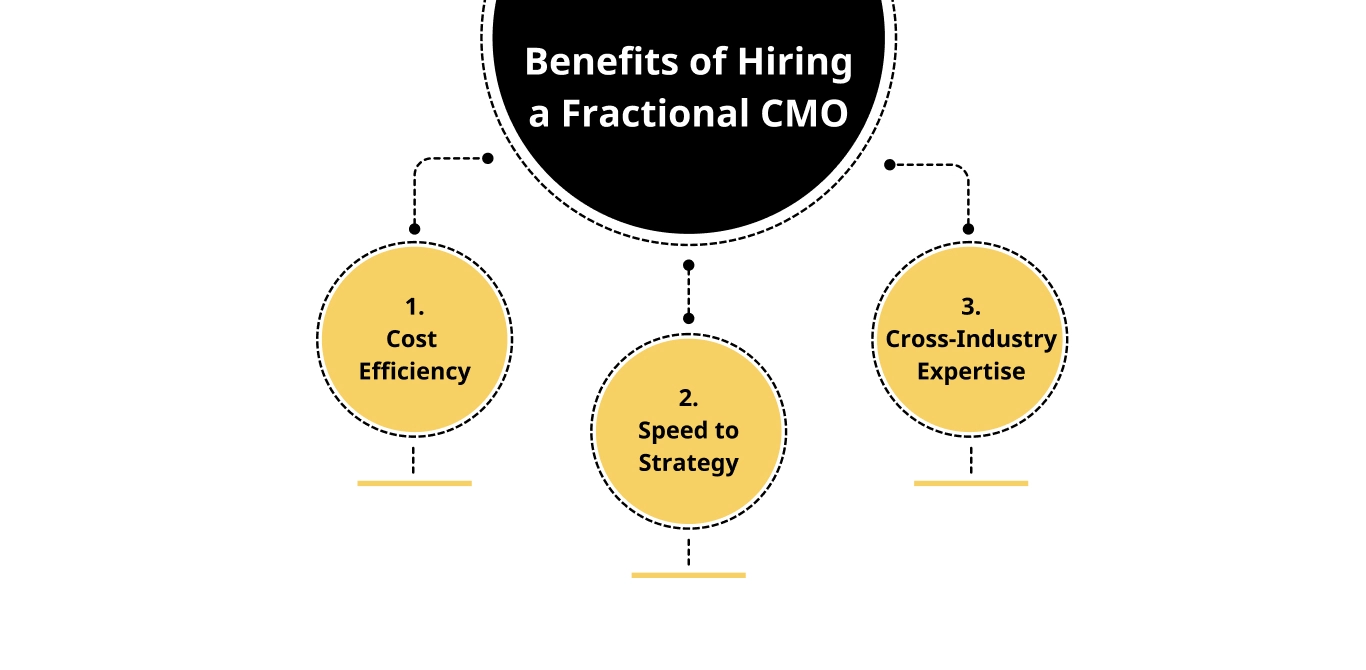In some companies, sales and marketing don’t work as a team: They aim for the same goals, but often speak different languages. This disconnect leads to mixed messages and lost opportunities. A Fractional Chief Marketing Officer can help solve this by aligning both sides under a shared strategy, increasing efficiency, and reducing the time to a closed deal without adding a full-time executive to the payroll.
According to HubSpot, 44.8% of marketers and 40.4% of sales professionals reported that alignment between sales and marketing became more important in 2022, yet miscommunication and separate funnels still hinder performance. Gartner adds that 47% of misalignment stems from disconnected lead funnels, directly impacting conversion rates and sales cycle time.
Remote work and hybrid setups have made this gap even wider. Teams are spread out and siloed. Without a well-defined plan, tasks often fall through the cracks. This is where a Fractional CMO comes in. This part-time marketing leader helps connect the dots. They bring focus, structure, and strategy, without the cost of a full-time hire.
More small and mid-sized companies are choosing fractional CMO services. They see it as a flexible way to get expert marketing help to connect sales with marketing.
What Is a Fractional CMO, and What Do They Do?
What Is a Fractional CMO?
A Fractional CMO is a part-time marketing leader. Hiring a Fractional CMO helps companies build strategy, guide teams, and improve results, all without hiring a full-time executive.
Fractional CMOs are not just consultants; they work within the business, leading teams and projects. They work to refine messaging that resonates with your target audience, ensuring that the marketing supports the sales team.
How They Compare
| Role | Time Commitment | Strategic Ownership | Team Leadership | Cost |
|---|---|---|---|---|
| Full-Time CMO | Full-time | Yes | Yes | High |
| Consultant | Project-based | Limited | No | Medium |
| Fractional CMO | Part-time | Yes | Yes | Flexible |
A full-time Fractional Chief Marketing Officer is great for large and small companies. Consultants help with short-term advice, but a part-time CMO offers leadership and flexibility. That’s why more startups and mid-sized firms are choosing this model, whether they’re B2B or B2C.
What Do They Actually Do?
- Cross-Functional Team Leadership: Leadership is an important part of the role. A part-time CMO works with internal teams and outside partners. They work closely with sales and product teams and coordinate with leadership to keep goals aligned.
- Strategic Planning Across Sales Funnels: A part-time CMO helps connect marketing with sales. They look at the full funnel, fix broken handoffs, and build systems that consistently bring in leads.
- Brand Positioning and Messaging: A fractional CMO shapes how a brand is seen by refining the value proposition and keeping messaging clear. They also help to build go-to-market strategies that reach the right audience.
- Data-Driven Decision-Making: They use data to make decisions. They set goals and track progress. They also adjust budgets based on what’s working. They don’t guess, they measure.
The part-time CMO focuses on marketing strategy, execution, and business alignment. They make sure marketing gets results.
Here’s a simple table that compares a Fractional CMO vs. a Traditional CMO side by side.
| Category | Fractional CMOs | Traditional CMOs |
|---|---|---|
| Time Commitment | Works part-time or on specific projects | Works full-time in a permanent role |
| Cost | Costs less each month (around $5K–$15K) | Costs more each year with salary and benefits (around $200K–$400K) |
| Team Leadership | Leads internal/external teams as needed | Leads the company’s internal marketing team |
| Strategic Ownership | Handles big-picture planning and keeps teams aligned | Oversees strategy and daily execution |
| Flexibility | Works across multiple clients; scalable | Dedicated to one company; fixed scope |
| Best Fit For | Small to mid-sized growing companies that need flexible leadership and proven expertise | Enterprise companies with steady budgets and long-term plans |
| Hiring Speed | Quick onboarding, minimal overhead | Longer recruitment and integration process |
| Engagement Model | Works on contract, retainer, or as an advisor | Hired full-time with a long-term role |
| Risk Profile | Lower financial and operational risk | Higher investment and long-term dependency |
| Business Alignment | Helps connect marketing with sales and product teams | Works closely with all departments to stay aligned |
How a Fractional CMO Aligns Sales and Marketing
Building Unified Buyer Personas
A fractional CMO works with both sales and marketing to build shared buyer profiles. Instead of each team chasing different types of leads, they create one clear view of the ideal customer. They map the full customer journey, define what qualifies a lead, and sync everything with CRM systems. This keeps both teams aligned and accountable by measuring agreed-upon KPIs and focusing on the same goals.
Streamlining Messaging Across Touchpoints
They keep the brand voice consistent from start to finish. The messaging stays clear whether it is B2B or B2C. People trust your brand when it’s easy to recognize and stays consistent across all the channels.
Data-Driven Collaboration
A part-time CMO sets common goals and creates reports and dashboards for both sales and marketing to use. They track where leads come from and measure return on investment. They also make sure both teams are using the same data to stay aligned. When both teams use the same metrics, decisions are clearer and results are easier to track.
Teams with aligned sales and marketing see up to a 36% increase in conversion rates, according to WinSavvy’s 2024 alignment statistics.
Compared to a traditional CMO, a fractional CMO offers flexible leadership and quick integration. You get senior-level support without the cost or commitment of a full-time hire.
If your teams need alignment but you’re not ready to expand your payroll, hiring a fractional CMO might be the right move.
Benefits of Hiring a Fractional CMO

Cost Efficiency
A fractional CMO is a smart choice for companies that need expert help without paying for a full-time executive - no salaries and bonuses, no health insurance bills, no long-term contracts tying you down. Instead, you leverage the expertise for what you need, whether it’s a single campaign or ongoing monthly support. It’s perfect for teams that are scaling.
Speed to Strategy
A fractional CMO can step in quickly, assess your current strategy, and start making changes without internal delays. They help teams focus and simplify what matters most, making sure the work gets done.
Cross-Industry Expertise
A fractional CMO brings experience from other industries. This knowledge enables them to adapt messaging and strategy to fit different industry sectors and markets. In addition, this enables them to make experience-based decisions that avoid pitfalls and shorten the path to success.
When to Choose a Fractional CMO Over a Traditional One
Many times, a company can’t afford or doesn’t need a full-time marketing leader. Often, a fractional CMO is a better fit.
Ideal Scenarios
Your startup’s growing fast, and you need someone to lead strategy and structure. But you don’t need a full-time salary weighing you down. That’s where a fractional CMO comes in: experienced marketing leadership without the extra cost.
If you’re running a mid-sized company with a small team, you likely have people who know how to get things done. However, you also need someone who can develop a vision, lead, clarify the message, and keep everything on track. Additionally, a fractional CMO can identify gaps in personnel and help recruit suitably qualified new hires.
Decision Framework
Before you decide, consider:
- Do you need a smart strategy but not a full-time hire?
- Are sales and marketing working in silos?
- Is a new product or service launch coming up with no one to lead it?
- Do you want results without a long-term contract?
If that sounds familiar, fractional CMO services are worth considering.
Conclusion: When Expertise Meets Flexibility
If your team needs direction but not another full-time executive, it is time to hire a fractional CMO. Whether you’re scaling quickly or launching something new, or just trying to get sales and marketing on the same page, a fractional chief marketing officer gives you senior-level support without the long-term contract.
The Field Group has expertise in fractional CMO services for startups and small businesses. Our team helps sharpen your brand, drive revenue, and keep things focused, especially when you’re in the middle of change and striving to grow. We have worked across tech, media, and consumer goods, so we know how to step in and get results.
Ready to align your teams and grow your revenue? Explore how fractional CMO services can bring clarity and results to your business.
FAQs:
How does a fractional CMO differ from a full-time CMO?
The difference is commitment and cost: fractional CMOs work by the hour or retainer and focus on fast strategic impact, while full-time CMOs are permanent, operationally embedded employees.
Fractional CMO vs consultant vs agency, which is best?
A fractional CMO embeds as executive leadership (strategy + people alignment), a consultant gives recommendations (less embedded), and an agency typically executes tactics. Choose a fractional CMO when you need leadership, alignment and accountability, not just advice or execution.
Comparison of Fractional CMO vs. Consultant vs. Traditional CMO
When should my company hire a fractional CMO?
Common triggers: growth is plateauing, you’re scaling quickly (or preparing for fundraising), you lack senior marketing leadership, or you need sales-marketing alignment fast without a full-time hire.
Why choose a Fractional CMO over a traditional (full-time) CMO?
A fractional CMO delivers senior strategy and sales-marketing alignment at a fraction of the cost and with far greater flexibility than a permanent hire, making it ideal for startups and SMBs that need executive guidance without long-term overhead.
How does a Fractional CMO align sales and marketing?
They create shared KPIs/SLAs, implement lead scoring and CRM workflows, set joint cadences, and centralize martech/reporting so both teams pursue the same revenue outcomes.








